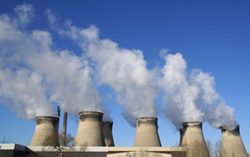WCI: Use ASTM D6866 to Determine Biomass Fuel Portion of CO2 Emissions
The Western Climate Initiative recommends ASTM D6866 analysis to determine the biomass fuel portion of carbon dioxide emissions produced by the combustion of mixtures of biomass fuel and fossil fuel. This mandate also covers municipal solid wastes, which have been categorized by the WCI as waste-derived fuels.

In the recently published final draft of essential requirements of mandatory reporting, the WCI states that owners or operators of facilities that combust fuels or fuel mixtures for which the biomass fuel fraction is unknown or cannot be documented shall quantify the biomass fuel portion of CO2 emissions using ASTM D6866.
Exempted from using ASTM D6866 are facilities that combust (a) fuels containing less than 5 percent biomass fuel by weight or (b) waste-derived fuels that are less than 30 percent by weight of total fuels combusted in the year for which emissions are being reported.
Quarterly ASTM D6866 Testing
The WCI mandates that operators shall conduct ASTM D6866 analysis on a representative fuel or exhaust gas sample at least every three months. Gas samples will be collected over at least 24 consecutive hours following the standard practice specified by ASTM D7459-08.
Operators of facilities with multiple combustion units having a common fuel source may conduct ASTM D6866 testing for one of the units.
ASTM D6866 Analysis for Waste-Derived Fuels
The WCI considers fossil fuels like waste oil, plastics, or solvents and biomass such as dried sewage or impregnated saw dust as waste-derived fuels. Fractions of both fossil fuels and biomass such as municipal solid waste or tires are also waste-derived fuels.
Operators of facilities that (a) combust waste-derived fuels that are not pure biomass or (b) co-fire fossil fuels with biomass fuels or waste-derived fuels that are partly biomass fuels are ordered to use ASTM D6866 to determine the portion of emissions associated with the combustion of biomass-derived fuels.
Western Climate Initiative
The WCI aims to identify, evaluate, and implement ways to reduce greenhouse gases in Arizona, British Columbia, California, Manitoba, Montana, New Mexico, Ontario, Oregon, Quebec, Utah, and Washington.
Related Articles:
WCI Recommends ASTM D6866
Beta Analytic’s Public Comments on WCI’s Essential Requirements of Mandatory Reporting
This entry was posted on Sunday, May 10th, 2009 and is filed under Biobased Regulations, Renewable Carbon .